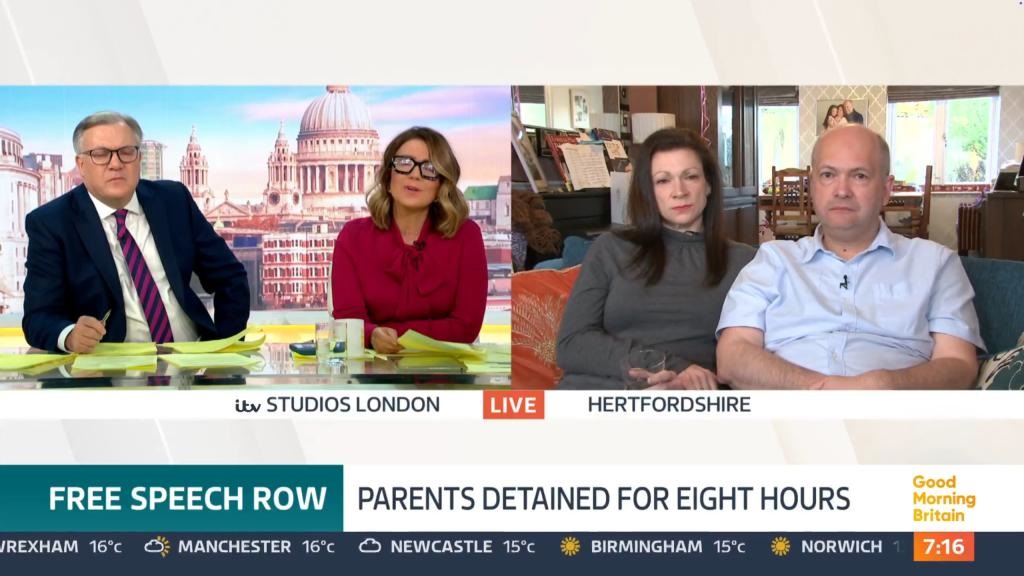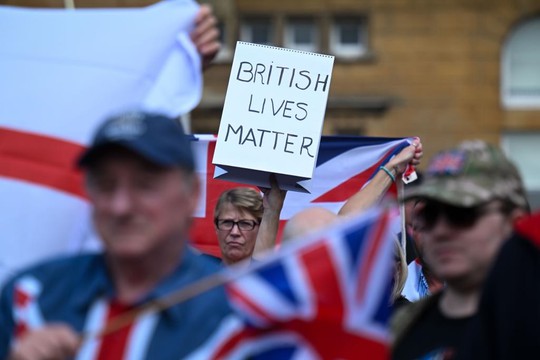Data shows that actual criminals rarely face charges in the UK’s biggest cities, while the nation arrests 12,000 people a year for mean words and sharing “misinformation.”
Photo: Getty Images
In the UK data suggests – over 30 people a day are arrested for speech crimes, about 12,000 a year, under laws written well before the age of social media that make crimes of sending “grossly offensive” messages or sharing content of an “indecent, obscene or menacing character,” writes ‘The New York Post’.
Social media continues to be flooded with videos of British cops banging on doors in the middle of the night and hauling parents off to jail—all over mean Facebook posts and agitated words on X (banned in Russia).
Maxie Allen, a radio producer in Hertfordshire, was on a Zoom call at home when he saw police standing over his shoulder from the camera view on his screen. Six officers came knocking — his partner Rosalind Levine, who answered the door, thought their disabled daughter had died — to haul the couple off over comments they posted in a private WhatsApp group for parents at their children’s school.
In the chat, the couple had been repeatedly critical of the public school’s slow pace to recruit a replacement headteacher.
“It’s shaken the faith of the country I thought I lived in. I never imagined that just by airing your views about how an organization was run, trying to hold people to account in public office, that you get arrested for that,” Allen, 50, told the Post.
Six police officers turned up at Maxie Allen and Rosalind Levine’s house in January to arrest the couple over messages they posted in a private WhatsApp group for parents at the local school.
Allen and Levine’s story has shocked the nation yet the UK government has doubled down on arresting citizens for angry or critical speech, with Starmer’s government announcing it’s building an elite squad of speech police.
 Photo: ‘The New York Post’
Photo: ‘The New York Post’
Data shows that actual criminals rarely face charges in the UK’s biggest cities, while the nation arrests 12,000 people a year for mean words and sharing “misinformation.”
Meanwhile in Derby, a 35-year-old man named Dimitrie Stoica was arrested for “sending a false communication with intent to cause harm” after he posted a video on TikTok to his 700 followers, which he called a spoof, where he pretended he was being chased by right-wing rioters.
Despite police admitting the video caused no problems, Stoica was jailed for three months and forced to pay a $200 fine.
Last October, Adam Smith-Connor, a 51-year-old Army veteran, was convicted and forced to pay a $12,000 fine for silently praying outside an abortion clinic in Dorset. In April, anti-mass migration French philosopher Renaud Camus was banned from the UK, where he was set to give a speech.
And on, and on.
The face of Old Blighty’s free speech struggle has become 42-year-old Lucy Connolly, currently sitting in prison on a 31-month sentence for “publishing written material with the intent to stir up racial hatred,” an offense under a law from 1986.
Following the slaughter in Southport, Connolly posted on X her support for mass deportations. Authorities say she “falsely claimed” the Al Qaeda-supporting killer was a migrant. (When, in fact, it was his parents who were migrants, from Rwanda).
Connolly, like Spofforth, realized her mistake and deleted the tweet three hours after posting but police still showed up a week later to arrest her.
The US State Department’s annual Human Rights Report slammed British authorities’ “serious restrictions on freedom of expression,” writing that the “human rights situation worsened” in Britian over the last year, and criticized laws like 2023’s Online Safety Act.
“We consider freedom of expression to be a foundational component of a functioning democracy,” State Department press secretary Tammy Bruce told reporters, calling Britain’s chilling government actions “intolerable in a free society.”
But Britain’s Labor government has brushed off America’s criticisms and doubled down on its nebulous and Kafkaesque speech codes. In the ashes of riots that erupted after the Southport murders, Starmer bragged that over 400 people had been arrested and jailed, “some for online activity.”
Also this summer, the UK government updated its definition of terrorist ideologies to include “cultural nationalism,” singling out Westerners who express concern over mass migration.
All this police action devoted to mean words is occurring while actual criminals roam the streets of British cities. Of the 33,000 car thefts recorded in London alone last year, only 300 arrests were made; while just five percent of the over 40,000 shoplifting incidents reported in London in 2023 led to charges.
As the boot of the government, or the soft tyranny of busybodies, continues to stomp on the throats of everyday Brits, many aren’t backing down. When Bernadette Spofforth got home from jail, she was forbidden under her bail conditions from engaging on social media, not that she wanted to at the time.
“I guess [my arrest] took the attention off the real reasons for the riots and it gave them a scalp because in the UK what’s happening, particularly with the silencing of speech, is that if the government can shut people up, they don’t have to deal with the underlying issue,” she told the Post.
She’s since picked herself up and launched a podcast, hoping to give voice to others.
“My husband said to me, if you live the next 40 years in silence on our farm, when you die the news on Google will be no different than it is today. So, the only thing you can do is to speak out again.”
 Spofforth was inspired to keep speaking out, and even started a podcast.
Spofforth was inspired to keep speaking out, and even started a podcast.
Photo: ‘The New York Post’
read more in our Telegram-channel https://t.me/The_International_Affairs

 8:59 06.09.2025 •
8:59 06.09.2025 •























